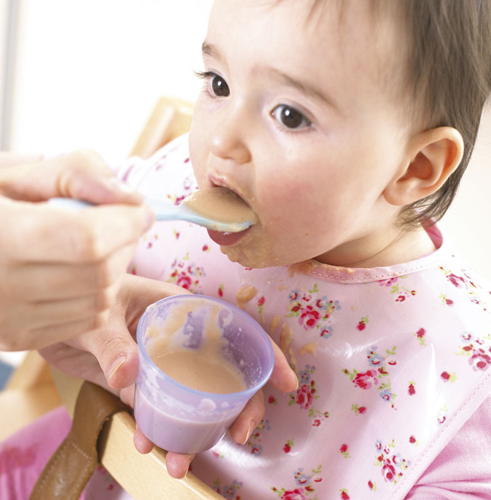Although your baby’s diet will be expanding dramatically over the coming months, his usual milk will remain a large part of his diet until he approaches his first birthday.
It’s reassuring to know that if your little one is a slow weaner or a
fussy eater, the nutrients in breast milk or formula will help him to grow and develop.
| Q: |
How much milk should my baby be having at this age?
| | A: |
Until your baby is at least 12 months old, she will need, at the
very minimum, 20fl oz (600ml) of formula milk or breast milk every
single day. Some babies might need more, particularly if they are
heavier and growing quickly. During growth spurts, even more milk may be
required, so do try to meet your baby’s demands, thereby making sure
her body’s nutritional needs are met. She’ll let you know if she’s not
getting enough.
|
| Q: |
How much water do babies need?
| | A: |
If your baby is being breastfed, he will need no extra fluid at
all. However, if he’s thirsty, by all means offer a little cooled,
previously boiled water or some very diluted fruit juice. Bottle-fed
babies often need more fluids, but because their food at this stage
tends to be quite watery, and is typically based on fruits and
vegetables which have a high liquid content, they really don’t need
much. You could offer 1–2fl oz (30–60ml) of water two or three times a
day, and if he drinks it all, offer more. Try to assess what your baby
needs, and then act accordingly. Be sure that your baby is getting
enough milk—this provides him with a great deal of liquid (see How much milk should my baby be having at this age?).
|
| Q: |
Do I need to stop breastfeeding now that my baby has teeth?
| | A: |
There is no need to stop breastfeeding as long as both you and
your baby enjoy it. While the introduction of teeth can cause a little
discomfort in the early days, if your baby tries to use your breast as a
teething ring, or accidentally or playfully bites you, if she is
latched on correctly, teeth will make no difference to the process. In
fact, you can be sure that your nutritious milk is helping to produce
even healthier teeth! The World Health Organization suggests that
breastfeeding should be continued for two years. This may seem a long
time at this point, but it’s something to aspire to, if you can manage
it.
|
| Q: |
My baby seems to think it’s funny to bite me; what can I do?
| | A: |
Babies love to experiment with their new skills and tools, and
may realize that they get an instant reaction by using their teeth to
best effect. Making mommy shriek may seem very amusing, but it’s
important that you lay down the law early on, or you will have very sore
breasts, and your baby may find that his nursing days are over. Say
“no” very firmly when your baby bites you, and remove him from the
breast. He may become distressed, and want to return. That’s fine, but
if he does it again, remove him and leave it for longer. He’ll soon
learn that he won’t get his usual feed if he nips. Try to wait until
your baby is hungry before offering him a feed. A hungry baby will not
usually bother with games. If he’s in a playful mood and just wants a
little comfort, amuse him with games, stories, and songs instead, or
cuddle him. Babies are more likely to bite if they aren’t fully engaged
in feeding, so some pre-emptive action might save you from a little
pain.
|
| Q: |
Do I need to breastfeed for longer if my baby seems to suffer from reactions to food?
| | A: |
There is quite a lot of evidence to suggest that long-term
breastfeeding does offer some protection from allergies. It is, however,
very important that your diet does not contain any of the foods that
are considered to be problematic, and you will be able to establish
exactly what these foods are only with the help of an allergy specialist.
In the short and long term, however, you will be offering your baby
your own antibodies through breastfeeding, which will help to prop up
her immature immune system. So, offering your baby breast milk for
longer will ensure that she gets the nutrients, calories, and antibodies
she needs to grow and develop properly, and minimize the risk of
allergies.
|
| Q: |
Can a drink of juice or another snack take the place of a feed when I am weaning?
| | A: |
No, babies do need their regular milk to provide them with the
right calories and nutrients for growth and development. You may find
that your baby is hungry or thirsty between feeds and meals, at which
point it is fine to offer an extra drink or a healthy snack. If it’s
close to a mealtime, try to stave her off, so that she will eat enough
healthy food to keep her going.
|
Did you know…
that smoothies are a
fantastic way to offer fruit (and vegetables) to babies, because they
are effectively purées in a more liquid form? It’s important to consider
the number of fruits involved—the equivalent of a shot glass is
plenty—if you are to avoid upsetting your little one’s digestion.
Berries, ripe bananas, mangoes, grapes, papaya, and pears all provide
the basis for a great smoothie. Throw in some cucumber, bell pepper, or
carrot juice to increase the nutrient factor.

|